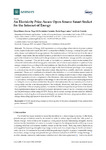Mostrar o rexistro simple do ítem
An Electricity Price-Aware Open-Source Smart Socket for the Internet of Energy
| dc.contributor.author | Blanco, Óscar | |
| dc.contributor.author | Fernández-Caramés, Tiago M. | |
| dc.contributor.author | Fraga-Lamas, Paula | |
| dc.contributor.author | Castedo, Luis | |
| dc.date.accessioned | 2017-09-19T14:08:09Z | |
| dc.date.available | 2017-09-19T14:08:09Z | |
| dc.date.issued | 2017-03-21 | |
| dc.identifier.issn | 1424-8220 | |
| dc.identifier.issn | 1424-8239 | |
| dc.identifier.uri | http://hdl.handle.net/2183/19492 | |
| dc.description.abstract | [Abstracts] The Internet of Energy (IoE) represents a novel paradigm where electrical power systems work cooperatively with smart devices to increase the visibility of energy consumption and create safer, cleaner and sustainable energy systems. The implementation of IoE services involves the use of multiple components, like embedded systems, power electronics or sensors, which are an essential part of the infrastructure dedicated to the generation and distribution energy and the one required by the final consumer. This article focuses on the latter and presents a smart socket system that collects the information about energy price and makes use of sensors and actuators to optimize home energy consumption according to the user preferences. Specifically, this article provides three main novel contributions. First, what to our knowledge is the first hardware prototype that manages in a practical real-world scenario the price values obtained from a public electricity operator is presented. The second contribution is related to the definition of a novel wireless sensor network communications protocol based on Wi-Fi that allows for creating an easy-to-deploy smart plug system that self-organizes and auto-configures to collect the sensed data, minimizing user intervention. Third, it is provided a thorough description of the design of one of the few open-source smart plug systems, including its communications architecture, the protocols implemented, the main sensing and actuation components and the most relevant pieces of the software. Moreover, with the aim of illustrating the capabilities of the smart plug system, the results of different experiments performed are shown. Such experiments evaluate in real-world scenarios the system’s ease of use, its communications range and its performance when using HTTPS. Finally, the economic savings are estimated for different appliances, concluding that, in the practical situation proposed, the smart plug system allows certain energy-demanding appliances to save almost €70 per year | es_ES |
| dc.description.sponsorship | Galicia. Consellería de Cultura, Educación e Ordenación Universitaria; ED431C 2016-045 | es_ES |
| dc.description.sponsorship | Galicia. Consellería de Cultura, Educación e Ordenación Universitaria; ED341D R2016/012 | |
| dc.description.sponsorship | Galicia. Consellería de Cultura, Educación e Ordenación Universitaria; ED431G/01 | |
| dc.description.sponsorship | Agencia Estatal de Investigación; TEC2013-47141-C4-1-R | |
| dc.description.sponsorship | Agencia Estatal de Investigación; TEC2015-69648-REDC | |
| dc.description.sponsorship | Agencia Estatal de Investigación; TEC2016-75067-C4-1-R | |
| dc.language.iso | eng | es_ES |
| dc.publisher | M D P I AG | es_ES |
| dc.relation | Xunta de Galicia (ED431C 2016-045, ED341D R2016/012, ED431G/01) | es_ES |
| dc.relation.uri | http://dx.doi.org/DOI10.3390/s17030643 | es_ES |
| dc.rights | Atribución 3.0 España | es_ES |
| dc.rights.uri | http://creativecommons.org/licenses/by/3.0/es/ | * |
| dc.subject | IoT | es_ES |
| dc.subject | IoE | es_ES |
| dc.subject | Smart plug | es_ES |
| dc.subject | Energy monitoring | es_ES |
| dc.subject | Electricity-price awareness | es_ES |
| dc.subject | Home automation | es_ES |
| dc.subject | Power demand | es_ES |
| dc.subject | HEMS | es_ES |
| dc.title | An Electricity Price-Aware Open-Source Smart Socket for the Internet of Energy | es_ES |
| dc.type | info:eu-repo/semantics/article | es_ES |
| dc.rights.access | info:eu-repo/semantics/openAccess | es_ES |
| UDC.journalTitle | Sensors | es_ES |
| UDC.volume | 17 | es_ES |
| UDC.issue | 3 | es_ES |
| UDC.startPage | 1 | es_ES |
| UDC.endPage | 34 | es_ES |
| dc.identifier.doi | 10.3390/s17030643 |
Ficheiros no ítem
Este ítem aparece na(s) seguinte(s) colección(s)
-
GI-GTEC - Artigos [190]






